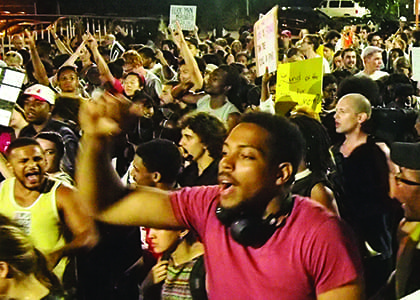
Sixth Suffolk District Representative Russell Holmes was on the floor of the House July 5, knee-deep in legislative wrangling when he heard the news that Alton Sterling was shot to death by police in Baton Rouge. The next day, he and other legislators were working through one of the longest days of the session when Philadro Castile was gunned down by a police officer in Falcon Heights, Minnesota.
There was no mention of the events in the Legislature.
“No one said, ‘Let’s have a moment of silence,’” Holmes said. “There were protests going on across the country and still no acknowledgement on the House floor.”
But when five police officers were gunned down in Dallas July 7, Holmes’ phone lit up.
“I had the governor call me,” he said. “I had the mayor call me. Now folks wanted to do something.”
Holmes, who is chairman of the Massachusetts Legislative Black and Latino Caucus, decided to do something different. He and other Caucus members drafted a letter outlining the urgency of passing criminal justice reforms at the state and local level, many of which were prompted by the nationwide movement to counter police abuse of blacks.

A large demonstration protesting the police shootings of blacks wound through Roxbury on July 13.
“We’ve joined with the mayor and governor for peace walks and church services,” he said. “We said, ‘Before we become united, let’s be clear what we’re uniting around.’”
At the local level the letter calls for body cameras, a civilian review board and anti-bias training for Boston police officers. At the state level, the letter calls for passage of legislation that would require police departments to collect and share data on traffic and pedestrian stops broken down by race, establishing special independent prosecutors to investigate officer-involved shootings and amending state wiretapping laws to protect the rights of civilians who record law enforcement officers.
“Vigils and rallies cannot address this problem alone,” the letter reads. “While there is a place for these important gatherings, verbal expressions of solidarity in grief are not enough. We need action now in the form of concrete policy changes.”
First Suffolk District Senator Linda Dorcena Forry said legislators have a narrow window to move forward their proposals, given the timing of the Republican and Democratic national conventions. After July 31, the Legislature will go into recess.
“We only have three days,” Dorcena Forry said. “We have an opportunity in Massachusetts to push forward reforms that have been in the Legislature for a long time.”
The letter the caucus members circulated references the police shootings of Castile, Sterling and the Dallas police officers, and was signed by every elected official of color in Boston except state Rep. Jeffrey Sanchez and Anissa Essaibi George.
Holmes says a newer version of the letter will also reference the six police officers shot in Baton Rouge and will be circulated among local officials of color throughout Massachusetts for signatures. The Black and Latino Caucus members plan to meet with Senate President Stanley Rosenberg, House Speaker Robert DeLeo, Governor Charlie Baker and Boston Mayor Martin Walsh.
Dorcena Forry said informal conversations with Senate leadership indicate that several pieces of legislation could move forward before the end of the session.
“We want to work collaboratively with the House, the Senate and the governor,” she said. “
Ultimately, Holmes said, Caucus members are accountable to their constituents, many of whom have taken to the streets to demand change.
“We want our constituents to know that we hear them,” he said. “They’re not holding rallies and protests just to vent. They’re a call to action. We believe there are some things that can be done before July 31.”
While videos of police shootings of blacks across the United States have proliferated on social media, Boston has remained relatively quiet. Yet data released by the Boston Police Department in recent years has confirmed that blacks are more likely than people of any other race to be stopped, questioned and/or searched by Boston officers.
Many of the legislative proposals currently stuck in House committees are aimed at combatting unconstitutional police practices, such as stopping and searching people without probable cause. Simply requiring police departments to collect and share data on stops could give civil rights organizations the grounds to challenge those practices.
Other measures, like the provision for an independent prosecutor to investigate officer-involved shootings, are in response to the police shootings in other states. Just because such incidents haven’t happened in Boston in the last ten years doesn’t mean they can’t, Dorcena Forry says.
“It could happen here,” she said. “I don’t want people to rest on their laurels. Anything could happen.”






